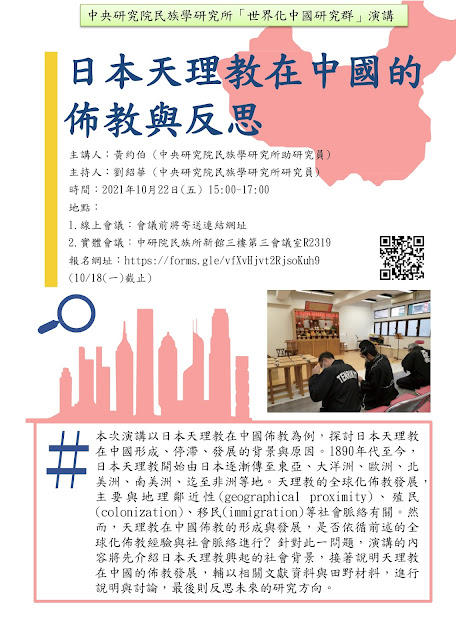主講人:Naomi Hellmann(納敏)(PhD candidate, University of Utrecht、本所訪問博士生)
主辦單位:中研院民族所「世界化中國研究群」
時間:8月20日(五)15:00~17:00
地點:線上會議,會議前將寄送連結網址
報名網址:https://forms.gle/aCBaNQbUVWppuuou9
(因系統人數限制,有收到信件連結者才表示報名成功)
會議聯絡mail:gcstudies@gate.sinica.edu.tw
摘要:
This paper is concerned with cross-border
ethnic groups in Sino-Southeast Asia – the area where southwestern China and
northern continental Southeast Asia meet. More specifically, my research
focuses on the case of the Wa in the Wa Hills – an old civilization that
predates the making of modern states. Today, the area is carved up and fixed by
territorial subunits with varying degrees of autonomy that traverse the
Sino-Burmese border: the Wa Self-Administered Division (Special Region 2) in
the northeastern Shan State in Myanmar, and Ximeng Wa Autonomous County,
Cangyuan Wa Autonomous County, and Wa ethnic townships in northern Lancang Lahu
Autonomous County in southwestern Yunnan Province in China. Ethnically, it is a
diverse region with numerous Native highland peoples, who share common
characteristics such as language, ancestry, and cultural beliefs that provide
the foundation for a nation (ethnic), and of whom the Wa constitute the
majority group (75 to 80 percent) with a population of approximately one
million people. These so-called cross-border ethnic groups often have potential
contradictory implications: they may be seen as both a source of threat and
support for nation and state-building efforts. As such, they are simultaneously
brought together and yet also kept apart.
The
paper is divided into four sections – the first is a consideration of material
collected on ethnic groups in China and in Myanmar. The second section provides
an overview of Chinese and Burmese ethnopolitics, that is, the state’s mode of
administering and governing frontier ethnic minority areas, and China’s
territorial expansion and border policies since economic reforms in the 1970s and,
in particular, in the three decades since the early 1990s. The third section
focuses on the case of the Wa people in the Wa Hills, which is illustrative of
the situation that exists across the Sino-Burmese border. Finally, the last
section examines in more detail the effects of China’s transformation on
cross-border ethnic groups and ethnic autonomous territories both locally and
beyond the border. I suggest that, in the case of the Wa, the process of
‘opening up’ has involved a shifting of the border and brought about an
increasing asymmetry in relations between the two sides.






